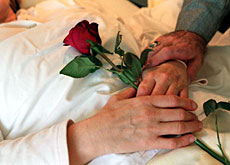Switzerland – death tourism capital?

Dignitas, one of four organisations offering assisted suicide in Switzerland, has come under fire for offering its services to foreigners and the mentally ill.
The group was recently thrust into the media spotlight following a British television report.
Since then, the Zurich authorities have voiced their anxiety that Switzerland might become a centre for people wishing to take their own lives.
Like its counterparts, the Zurich-based Dignitas takes advantage of Switzerland’s liberal laws on assisted suicide, which stipulate that a person can only be prosecuted if they are acting out of self-interest.
But Dignitas is the only group offering its services to foreigners, who seek help in Switzerland because assisted suicide is illegal in their home countries.
Most of the people who have used the group’s services have been terminally ill, but controversially some have been suffering from mental illnesses.
Death with dignity
Dignitas says that it simply aims to give everybody the chance to die with dignity.
Ludwig Minelli, the group’s secretary general, believes that people should have the right to choose how and when they die.
“I am glad that we can offer such a possibility here in Switzerland,” he told swissinfo. “Because we see how awful the situation of these people can be and that death can be a friend of a human being.”
The group provides an introduction to a doctor who can supply the necessary drugs – barbiturates – on condition that the patient has made a rational decision to end his or her life, and even supplies an apartment in Zurich where the patient can go to take their fatal dose.
Afterwards, the Zurich authorities are informed, so that an autopsy can be carried out, as is the case with all suicides in Switzerland.
Last year, Dignitas helped 50 people die, 39 of whom were foreigners from countries including Germany, France, Greece and Israel.
Death tourism
And following a recent BBC documentary on Dignitas, the group was contacted by 40 more foreigners all interested in finding out more about assisted suicide.
Such international attention has not pleased the Zurich authorities, who are worried that Switzerland might gain a reputation as a centre for “death tourism”.
Andreas Brunner, the Zurich public prosecutor, says he is concerned about the international repercussions of Dignitas’s activities.
“If you have countries who don’t want this because, above all, this is an ethical question and foreigners then come to Switzerland for an assisted suicide, it could cause us some problems,” he said.
“It’s really my personal opinion that if this continues, Switzerland could become a suicide Switzerland.”
Minelli strenuously denies Brunner’s charges and is emphatic that anyone who wants or needs help be allowed to use Dignitas’s services.
“If Switzerland has such a liberal system, we should grant help not only to Swiss people but also foreign people,” he explained. “Anything else would be discrimination of foreigners.”
Mentally ill patients
But Dignitas hasn’t only come under fire for helping foreigners; it has also caused controversy by offering to help those who suffer from mental illnesses such as severe depression or schizophrenia.
Last year it helped four people with psychiatric problems to take their own lives.
The controversy stems from the fact that critics, among them doctors, say that mentally ill patients are not capable of taking a rational decision, as required by law, to end their lives.
This is a view shared by Thomas Schläpfer, a psychiatrist at Bern University Hospital and John Hopkins Hospital in Baltimore.
“It’s part of the depressive symptoms that people want to commit suicide, that they don’t have any outlook on life.
“But this is not a reasonable decision, it’s a biased outlook stemming from the disease itself,” he told swissinfo.
“And since the disease is treatable, it is totally and ethically wrong to offer suicide to these patients.”
Legalising euthanasia
Minelli argues that mentally ill patients can and should be able to take such decisions.
He backs up his argument with the fact that the Belgian parliament recently voted in favour of legalising euthanasia for patients who suffer from constant and unbearable physical or psychological pain, resulting from an accident or incurable illness.
But critics argue that this argument is weak at best since some forms of mental illness can be cured or at least treated.
Despite the controversy surrounding the group, however, Minelli points out that Dignitas has never fallen foul of the law.
And even the Zurich authorities admit that they have been unable to establish any legal grounds on which to shut it down.
Until they do, the group has vowed to continue providing its services to anyone who wishes to die with dignity.
swissinfo, Isobel Johnson
The Netherlands and Belgium are the only other countries where laws permit euthanasia or assisted suicide.
In Switzerland a person can only be prosecuted for an assisted suicide if they are acting out of self-interest.

In compliance with the JTI standards
More: SWI swissinfo.ch certified by the Journalism Trust Initiative
You can find an overview of ongoing debates with our journalists here. Please join us!
If you want to start a conversation about a topic raised in this article or want to report factual errors, email us at english@swissinfo.ch.